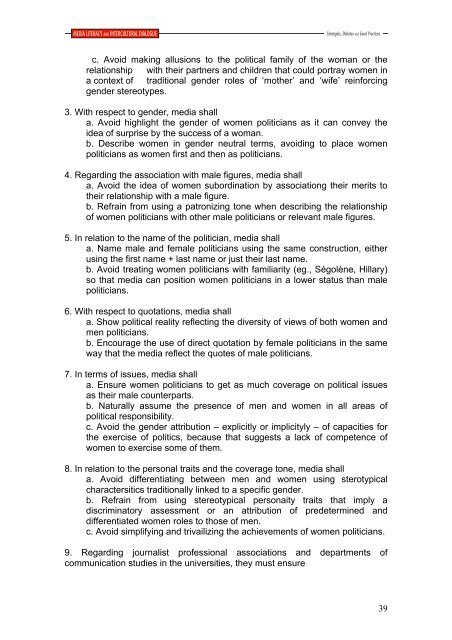Libro
Libro
Libro
You also want an ePaper? Increase the reach of your titles
YUMPU automatically turns print PDFs into web optimized ePapers that Google loves.
MEDIA LITERACY AND INTERCULTURAL DIALOGUE<br />
Strategies, Debates and Good Practices<br />
<br />
c. Avoid making allusions to the political family of the woman or the<br />
relationship with their partners and children that could portray women in<br />
a context of traditional gender roles of ‘mother’ and ‘wife’ reinforcing<br />
gender stereotypes.<br />
3. With respect to gender, media shall<br />
a. Avoid highlight the gender of women politicians as it can convey the<br />
idea of surprise by the success of a woman.<br />
b. Describe women in gender neutral terms, avoiding to place women<br />
politicians as women first and then as politicians.<br />
4. Regarding the association with male figures, media shall<br />
a. Avoid the idea of women subordination by associationg their merits to<br />
their relationship with a male figure.<br />
b. Refrain from using a patronizing tone when describing the relationship<br />
of women politicians with other male politicians or relevant male figures.<br />
5. In relation to the name of the politician, media shall<br />
a. Name male and female politicians using the same construction, either<br />
using the first name + last name or just their last name.<br />
b. Avoid treating women politicians with familiarity (eg., Ségolène, Hillary)<br />
so that media can position women politicians in a lower status than male<br />
politicians.<br />
6. With respect to quotations, media shall<br />
a. Show political reality reflecting the diversity of views of both women and<br />
men politicians.<br />
b. Encourage the use of direct quotation by female politicians in the same<br />
way that the media reflect the quotes of male politicians.<br />
7. In terms of issues, media shall<br />
a. Ensure women politicians to get as much coverage on political issues<br />
as their male counterparts.<br />
b. Naturally assume the presence of men and women in all areas of<br />
political responsibility.<br />
c. Avoid the gender attribution – explicitly or implicityly – of capacities for<br />
the exercise of politics, because that suggests a lack of competence of<br />
women to exercise some of them.<br />
8. In relation to the personal traits and the coverage tone, media shall<br />
a. Avoid differentiating between men and women using sterotypical<br />
charactersitics traditionally linked to a specific gender.<br />
b. Refrain from using stereotypical personaity traits that imply a<br />
discriminatory assessment or an attribution of predetermined and<br />
differentiated women roles to those of men.<br />
c. Avoid simplifying and trivailizing the achievements of women politicians.<br />
9. Regarding journalist professional associations and departments of<br />
communication studies in the universities, they must ensure<br />
39



